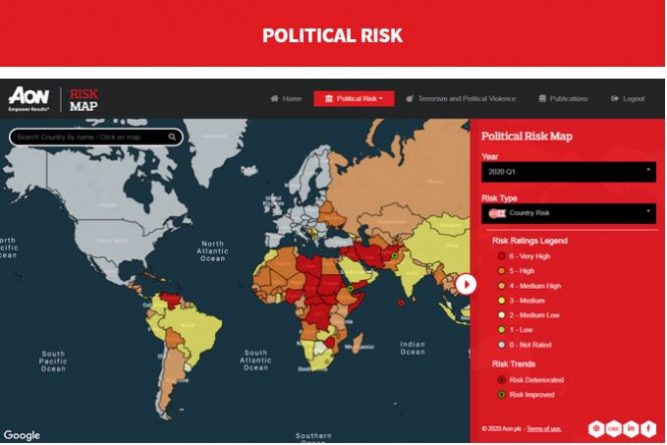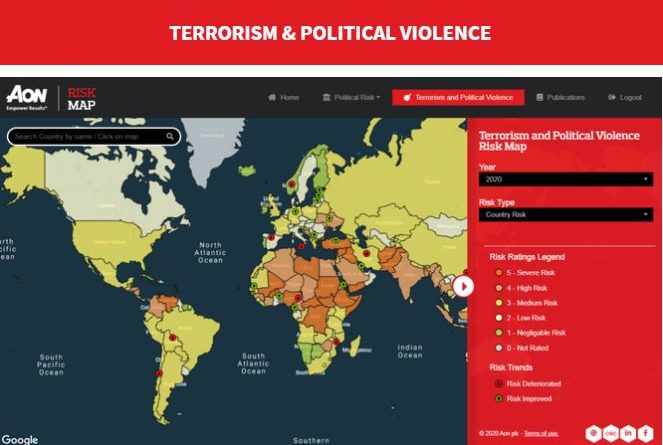Aon’s 2020 Risk Maps Find COVID-19 Pandemic Will Likely Accelerate Increasingly Interconnected Geopolitical Risks
- Economic and political nationalism is on the rise as action to protect public health and domestic economies erodes long-established business norms
- Three in five developed economies face the potential for strikes, riots and civil unrest in 2020, which are likely to be exacerbated by the COVID-19 pandemic
- Supply chain resilience is under significant pressure in an increasingly dislocated world
Aon plc (NYSE: AON), a leading global professional services firm providing a broad range of risk, retirement and health solutions, has published its 2020 Risk Maps report, which finds that the novel coronavirus (COVID-19) pandemic will likely transform the geopolitical landscape. Extraordinary public health measures and a precipitous drop in global trade will continue to exert significant pressure on economies and governments and will reshape long-standing geopolitical norms.
Aon developed the 2020 Risk Maps in partnership with The Risk Advisory Group and Continuum Economics, which examine political risk, terrorism and political violence globally. Aon’s Risk Maps are designed to help firms better understand and navigate evolving exposures created by these uniquely challenging risks.
In today’s complex geopolitical and economic environment, the maps enable clients to identify and track the different sources and degrees of risk, assisting businesses in planning and protecting assets, contracts and loans that could be adversely affected. This year’s report includes a special analysis of the impact of the COVID-19 pandemic on these themes and the risks they present.
The socioeconomic implications of the COVID-19 pandemic are likely to be profound. Countries that rely heavily on tourism or retail, or where there is a higher human toll from the pandemic, will face greater potential for civil unrest and government-focused protest – a risk that was already elevated prior to the pandemic. Aon’s report finds three in five developed economies face the potential of strikes, riots and civil unrest in 2020 – and it seems the COVID-19 pandemic will deepen those concerns.
Alicia Goosen, Chief Broking Officer at Aon South Africa, says there is an increased risk for civil unrest from a local point of view due to Government’s ongoing lockdown provisions in addition to the recent announcement that the sale of alcohol is, yet again, prohibited. “It is crucial for risk managers and business leaders to review their insurance programs and interrogate their cover provided by the South African Special Risk Insurance Association (SASRIA) against the risk of loss or damage caused by protests, riots, strikes, civil commotion and public disorder.”
SASRIA has stated that:
- It will not cover burglaries or theft of liquor and that clients will need to claim from their underlying insurance policies.
- Business interruption or loss of income claims following a non material damage due to Covid -19 or lockdown regulations cannot be considered as a valid SASRIA claim.
- It will investigate the merit of each matter to decide whether it is a valid SASRIA claim.
The pandemic will also test supply chain resilience, as economic nationalism in the form of expropriation, currency controls, trade restrictions and near-shoring curbs globalisation. Additional economic consequences include labour market disruption, consumer anxiety that restricts overall consumption, wider risk premia for equities and corporate debt, and restriction in corporate bond issuance and lending.
“COVID-19 is shaping up to be one of the most disruptive, world-changing events in living memory. The pandemic has transformed the way we live and work, and new challenges have appeared across industries and territories. In an increasingly complex and volatile business environment, informed decision-making has never been more important,” said Vlad Bobko, head of Crisis Management, Global Broking Centre, Aon.
“Through our Crisis Management practice, we have been supporting clients seeking to navigate these complex risks. Whether it is insulating against government intervention in emerging markets, preparing for sovereign and private counterparty defaults, or protecting people and operations from the threats posed by civil unrest, terrorism and kidnapping, our goal is to help protect against – and mitigate – a host of client exposures.”
The economic and political effects from the COVID-19 pandemic will be deep, with state intervention at levels not seen during peacetime. Public health precautions have, in many instances, eroded existing norms – including trade, contracts, supply chains and monetary policy – creating potential new exposures for international firms.
 Alicia Goosen, says, “Clients need to be very mindful of our Rand’s trading volatility, ensuring that they review their sums insured regularly to accurately reflect the shift in the currency’s exchange rate against the major currencies. The placement of assets policies are done on the basis of new replacement values to avoid average being applied to a claim; but amidst a volatile exchange rate, clients may find their current insurance covers woefully undergeared to match the volatility. An alternative approach that can be investigated with their insurers is provisions in their wordings to enable a fixed exchange rate for the insurance renewal period, thereby avoiding the application of average if there is a huge shift during the period.”
Alicia Goosen, says, “Clients need to be very mindful of our Rand’s trading volatility, ensuring that they review their sums insured regularly to accurately reflect the shift in the currency’s exchange rate against the major currencies. The placement of assets policies are done on the basis of new replacement values to avoid average being applied to a claim; but amidst a volatile exchange rate, clients may find their current insurance covers woefully undergeared to match the volatility. An alternative approach that can be investigated with their insurers is provisions in their wordings to enable a fixed exchange rate for the insurance renewal period, thereby avoiding the application of average if there is a huge shift during the period.”
Henry Wilkinson, head of Intelligence & Analysis and director at The Risk Advisory Group, said, “The COVID-19 pandemic is a turning point in global risk. The political, social and economic impacts are both immediate and profound, and systemically destabilising. Countries with an underlying risk of instability are likely to see negative trends accelerate as restrictions lift globally, with unrest and terrorism risks likely to rise. Old as well as new geopolitical fault lines are unsettling and becoming flashpoints, making crises and conflicts between states even more likely than in 2019. Businesses will need new strategies and tools to manage their exposure to survive and thrive. High-quality intelligence advice and data is a critical investment.”
Continuum Economics Lead Economist Francesca Beausang said, “It is still unclear whether the COVID-19 backlash against globalisation is more than a knee-jerk reaction, but the possibility of the U.S./China trade war turning into a global trade collapse cannot be ruled out.”
Additional key findings from the report include:
Civil Unrest,Terrorism and Political Violence
- Economic stagnation and frustration over a range of political, social and environmental trends are the primary drivers of heightened unrest in traditionally stable economies.
- Environmentalism is becoming an increasingly prominent cause of civil unrest.
- Extreme right-wing attacks are increasing and multinational businesses, particularly within the technology, banking and media sectors, are targets.

Political Risks
- Governments are increasingly resorting to measures that regulate market transactions. Emerging market governments have responded to rising populism by erecting barriers to trade and investment.
- Emerging market investors face significant headwinds linked to government expropriation, which is undermining contract certainty and eroding investor confidence.
- Political interference in emerging markets is now taking increasingly indirect forms, such as tax pressure, export restrictions, more stringent regulatory requirements, contract reviews and a general increase in government involvement in specific sectors of the economy.
Economic Risks
- The speed of individual emerging market (EM) recoveries following the COVID-19 pandemic will depend on the state’s ability to control the health crisis itself, the state of the economy before the COVID-19 pandemic and how much fiscal and monetary policy stimulus is administered.
- Significant monetary and fiscal policies are needed to limit the pandemic’s fallout on EM economies, though they will not fully offset it. Aggressive policy easing will not be enough to avert a fall in global growth by 1.3% in 2020.
- Global trade, labour and capital flows are severely challenged, as economic nationalism has become a widespread response to COVID-19.
More information about Aon’s 2020 Risk Maps is available here.




